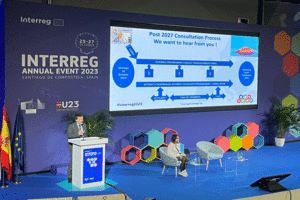News
The MOT at the Interreg Annual Event 2023: How to tackle post-2027 plans?
November 2023
In Santiago, the Commission launched a consultation of citizens and stakeholders to discuss the future of territorial cooperation. A "toolkit" dedicated to the implementation of public consultations, to which the MOT contributed, was thus created by DG REGIO. It can now be consulted online.
Every year, the Interreg Annual Event is an opportunity to discuss key issues relating to cooperation and Interreg programmes, whether cross-border, transnational, interregional or dedicated to outermost regions. The MOT took part in the 2023 edition of this major European event, which was held from October 25th to 27th in Santiago de Compostela, Galicia, at the invitation of the Spanish Presidency of the Council of the European Union. It was an opportunity to look back on the past, discuss the present, and reflect on the future of cooperation on a European scale.
To tackle this future, one of the Commission's priorities is to get closer to the community, to programme stakeholders but also to citizens, especially young people. As European Commissioner Elisa Ferreira pointed out at the event, there is no "one size fits all" solution to the obstacles to integration at borders, and, to make a real impact, we need to get closer to the areas involved and find common solutions to common problems.
The MOT’s contribution to a toolkit for the future
It is precisely to get closer to the needs of those most affected by Interreg projects that the DG Regio has decided to create, with the contribution of the MOT, a toolkit dedicated to the implementation of public consultations. Presented on the second day of the event, this toolkit proposes key questions and consultation methods for sounding out the opinions and experiences of citizens and stakeholders. DG Regio's plans to launch such consultations over the next year, with the aim of gathering results and recommendations for 2025 in order to shape the future of programmes post-2027.
Read the draft version of the Toolkit.

